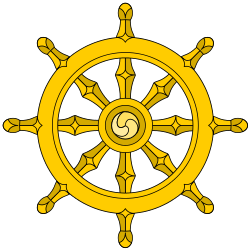Buddhist apocrypha
| Part of a series on |
| Buddhism |
|---|
 |
|
In Buddhist studies, particularly East Asian Buddhist studies, Buddhist apocrypha designate texts that are not accepted as canonical by the various traditions of Buddhism.[1] In East Asian Buddhist studies, the term is principally applied to texts that were actually written in East Asia, primarily China, but purport to be translations of Indian texts.[1]
Many of these texts were rejected by Buddhist monks or even banned as of low religious value and mostly have been lost,[2][3][4][5] but some popular and influential texts, such as the Humane King Sutra, are in fact apocryphal.
Examples
Influential works
Certain apocryphal works have been very influential in East Asian Buddhism, notably:
- Awakening of Faith in the Mahayana[6]
- Brahma's Net Sutra[7]
- Amitayurdhyana Sutra (觀無量壽佛經, Kuan wu-liang-shou fo ching)[8]
- Heart Sutra[9][lower-alpha 1]
- High King Avalokiteshvara Sutra
- Humane King Sutra
- Innumerable Meanings Sutra
- Sutra of Perfect Enlightenment[6]
- Sutra of the Heroic March, Śūraṅgama Sūtra (首楞嚴經, Shou-leng-yen ching)[7][lower-alpha 2]
- Sutra of the Original Acts which Adorn the Bodhisattvas (菩薩本業瓔珞經, P'u-sa ying-lo pen-yeh ching)[10]
- Sutra of Adamantine Absorption (金剛三昧經, Kŭmgang sammaegyŏng) – possibly of Korean origin
- Ullambana Sutra
Others
- Sutra on the Conversion of the Barbarians (老子化胡經, Lao-tzu Hua-hu ching)[6]
Collections
- Fragments[11][12][13]
- Sutras found in Dunhuang[14]
- Sutras found in Japan[15][16]
- Folk sutras[17]
- Some Jataka tales
See also
Notes
- ↑ Combination of original Chinese text and excerpts from work translated from Sanskrit, later back-translated into Sanskrit; scholarly consensus, disputed by some authors. See Heart Sutra#Nattier hypothesis.
- ↑ Chinese edition of Indic sources; see Śūraṅgama Sūtra#History.
References
- 1 2 Muller 1998, p. 63.
- ↑ 臺灣客語勸世文之研究-以〈娘親渡子〉為例
- ↑ 怎样辨别伪经?-外道魔障问答
- ↑ 助印佛经须知
- ↑ 涉嫌封建迷信、邪教、伪经伪书、混淆知见的书籍一览
- 1 2 3 Muller 1998, p. 64.
- 1 2 Muller 1998, p. 69.
- ↑ Muller 1998, p. 68.
- ↑ Nattier, Jan. 'The Heart Sūtra: A Chinese Apocryphal Text?'. Journal of the International Association of Buddhist Studies Vol. 15 (2), 1992. p. 153-223.
- ↑ Muller 1998, p. 68, 69.
- ↑ 疑經研究─中國佛教中之真經與疑經─
- ↑ 中國佛教偽經研究概述
- ↑ 中國疑偽佛典研究(Ⅰ-Ⅱ)
- ↑ CBETA 數位藏經閣古逸部全、疑似部全T85
- ↑ 七寺古逸経典研究叢書 全6巻
- ↑ The Digital Archives of Old Japanese Buddhist Manuscripts
- ↑ 藏外佛教文獻
Sources
- Muller, Charles (1998). "East Asian Apocryphal Scriptures: Their Origin and Role in the Development of Sinitic Buddhism". Bulletin of Toyo Gakuen University. 6: 63–76.
Bibliography
- Arai, K.; Bando, S.; Cleary, J.C.; Gregory, P.N.; Shih, H. (2005). Apocryphal Scriptures, Berkeley, Numata Center for Buddhist Translation and Research, ISBN 1-886439-29-X. (Translations of the Bequeathed Teaching Sutra, the Ullambana Sutra, the Sutra of Forty-two Sections, The Sutra of Perfect Enlightenment, and the Sutra on the Profundity of Filial Love)
- Buswell, Robert E.; ed. (1990). Chinese Buddhist Apocrypha, Honolulu: University of Hawaii Press, ISBN 0585349630
- Buswell, Robert E.; ed. (2003). Encyclopedia of Buddhism, New York: Macmillan Reference Lib. ISBN 0028657187
- Epstein, Ron (1976). The Shurangama-Sutra (T. 945): A Reappraisal of its Authenticity, presented at the annual meeting of the American Oriental Society, March 16-18, 1976, Philadelphia, Pennsylvania
- Mizuno, Kogen (1982). Buddhist Sūtras: Origin, Development, Transmission. Tokyo: Kosei Publishing,
- Mochizuki, Shinko, Pruden, Leo M.; trans.; Pure Land Buddhism in China: A Doctrinal History, The Translation of Texts-Spurious Scriptures. In: Pacific World Journal, Third Series Number 3, Fall 2001, pp. 271-275
- Nadeau, Randall L. (1987). The "Decline of the Dharma" in Early Chinese Buddhism, Asian Review volume 1 (transl. of the "Scripture Preached by the Buddha on the Total Extinction of the Dharma")
- Nattier, Jan (1992). 'The Heart Sūtra: A Chinese Apocryphal Text?', Journal of the International Association of Buddhist Studies Vol. 15 (2), pp. 153-223
- Swanson, Paul (1998). Apocryphal Texts in Chinese Buddhism. T'ien-t'ai Chih-i's Use of Apocryphal Scriptures: In: Arie Van Debeek, Karel Van Der Toorn (eds.), Canonization and Decanonization, Leiden; Boston: Brill, ISBN 9004112464
- Skilling, Peter (2010). Scriptural Authenticity and the Śrāvaka Schools: An Essay towards an Indian Perspective, The Estern Buddhist Vol. 41. No. 2, 1-48
This article is issued from Wikipedia - version of the 9/19/2016. The text is available under the Creative Commons Attribution/Share Alike but additional terms may apply for the media files.